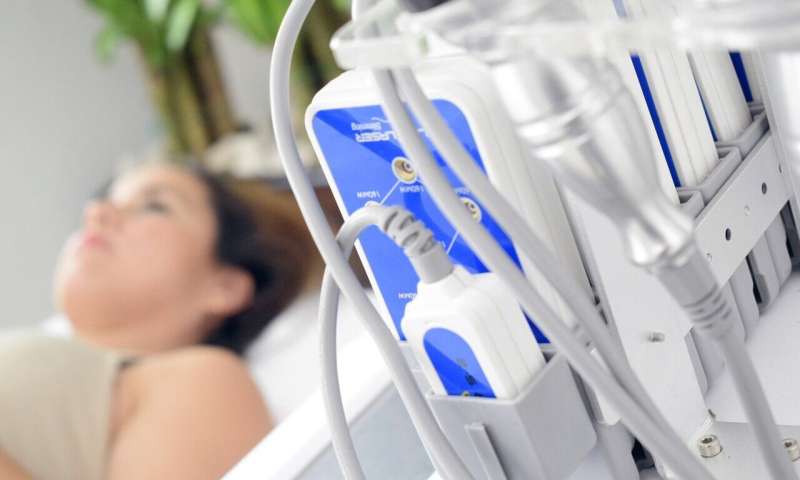
A novel therapy designed to help stimulate the body’s immune system response against cancer appears to be safe to use as alone or in combination with immune checkpoint inhibitors, according to an early phase clinical trial led by Martin Gutierrez, M.D., chief medical oncologist of the thoracic division at Hackensack University Medical Center’s John Theurer Cancer Center, a member of the Georgetown Lombardi Comprehensive Cancer Center Consortium.
The findings, published in the online edition of Clinical Cancer Research on November 4, suggest that BMS-986178, an investigational OX40 agonist, has an acceptable safety profile in patients with advanced solid tumors, whether used as monotherapy or in combination with the checkpoint inhibitors nivolumab (Opdivo) and/or ipilimumab (Yervoy). The rationale for using an OX40 agonist in this setting is based on its binding to the OX40 protein receptor found on memory T-cells, which can trigger a signal associated with production of additional T-cells. The newly published results appear to clear the way for the continued development of BMS-986178, starting with a Phase 2 breast cancer study.
“We were pleasantly surprised to find that T-cell stimulation with an OX40 agonist did not exacerbate the inflammatory response and other off-target effects of checkpoint inhibitors,” said Dr. Gutierrez, the study’s lead investigator and first author of the Clinical Cancer Research paper. “Indeed, the adverse events we observed in the monotherapy and combination cohorts were manageable, suggesting that BMS-986178 is safe to use in combination with checkpoint inhibitor therapy, and possibly also with a cancer vaccine.”
Bristol-Myers Squibb is developing BMS-986178 as a potential treatment for patients with solid tumors. BMS-986178 binds with a high affinity to the OX40 receptor, a member of the tumor necrosis factor receptor super family (TNFRSF), which includes several proteins with key roles in T-cell development and survival, immune activation, and anti-tumor immune responses.
“While nivolumab and ipilimumab have established a niche as viable treatments for several solid tumor types, many patients develop resistance to these checkpoint inhibitors, underscoring the need for novel immuno-oncology strategies,” explained Dr. Gutierrez. “In theory, adding an OX40 agonist to checkpoint inhibitor therapy would modulate the immunosuppression that occurs in the tumor microenvironment while enhancing the T-cell response. We tested whether we could safely combine these two immunomodulatory approaches.”
Dr. Gutierrez and colleagues conducted an open-label Phase 1/2a study of BMS-986178 (at doses ranging from 20-320 mg), both as monotherapy and in combination with nivolumab (240-480 mg) and/or ipilimumab (1-3 mg/kg of body weight), in patients with non-small cell lung cancer, renal cell carcinoma, bladder cancer, and other advanced solid tumors. Twenty patients were treated with BMS-986178 monotherapy, and 145 received various combination regimens.
After follow-up for as long as 103 weeks, the most common treatment-related adverse events (TRAEs) included fatigue, itching, rash, rise in body temperature, diarrhea, and infusion-related reactions. Overall, serious (Grade 3-4) TRAEs occurred in 1 of 20 patients (5%) receiving BMS-986178 monotherapy, 6 of 79 (8%) receiving BMS-986178 plus nivolumab, 0 of 2 receiving nivolumab monotherapy, 6 of 41 (15%) receiving BMS-986178 plus ipilimumab, and 3 of 23 (13%) receiving BMS-986178 in combination with both checkpoint inhibitors.
No deaths occurred in the study. There were no dose-limiting toxicities (side effects serious enough to prevent an increase in dose or level of treatment) observed with monotherapy. The maximum tolerated dose—the highest dose of a drug that does not cause unacceptable side effects—was not reached with escalating doses of either BMS-986178 monotherapy or any of the combination regimens.
The investigators did not observe objective tumor responses with BMS-986178 monotherapy. Objective response rates ranged from 0% to 13% among patients receiving combination therapy.
“We were somewhat surprised that the efficacy signals observed in preclinical trials did not translate to more robust efficacy in this first-in-human trial,” commented Dr. Gutierrez. “But our findings underscore the complexity of the immune system, and the importance of maintaining a delicate balance between the T-cell compartment and antigen-presenting cells in the tumor microenvironment.
“Our findings suggest we may be able to use OX40 activation as part of a priming intervention early in the course of certain cancers,” Dr. Gutierrez continued. “For example, we could use a cancer vaccine to prime T-cell stimulation, and then use an OX40 agonist to enhance T-cell activity.” As a next step, Dr. Gutierrez and colleagues plan to pursue such an approach in a Phase 2 study involving patients with triple-negative breast cancer, a type of breast cancer in which the tumor cells lack estrogen receptors, progesterone receptors, or large amounts of HER2/neu protein on their surface and have a more aggressive course than other breast cancers.
Source: Read Full Article
